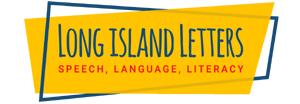Educational-based speech language pathology is playing a bigger role in the literacy success of children and adolescents. Related professions and teachers are starting to become more aware of our unique skill set and how we play a critical role in education.
The following document is posted on the American Speech Hearing Association’s website, Literacy Gateway.
Speech-language pathologists (SLPs) have the specialized knowledge and experience needed to identify communication problems and to provide the help that children need to build critical language and literacy skills. SLPs are often the first professionals to identify the root cause of reading and writing problems through a child’s difficulty with language. SLPs help children to build the skills they need to succeed in school and in life.
The American Speech-Language-Hearing Association’s (ASHA) National Outcome Measurement System (NOMS) data indicates that more than 70% of teachers who responded to a survey believed that students who received SLP services demonstrated improved pre-reading, reading or reading comprehension skills. A majority of teachers also cited improvements in the student’s listening and written language skills and ability to communicate in socially-appropriate ways (pragmatics).
Key elements of a speech-language pathologist’s academic training relating to early language and literacy development include skills to:
* Build and reinforce relationships between early spoken language and early pre-literacy abilities and consider influences of parent-child interactions in early shared storybook interactions;
* Address difficulties involving phonological awareness, memory, and retrieval;
* Teach children to use tactile-kinesthetic and auditory cues in reading and writing;
* Analyze how the language demands of textbooks, academic talk, and curriculum may stress a student’s capabilities at different age and grade levels; and
* Conduct fine-grain analyses of written language, including spelling, to generate intervention that matches the needs of individual students.
How Speech-Language Pathologists Can Contribute
Speech-language pathologists (SLPs) are key members of the team responsible for helping students learn to read and write. SLP’s contribute in the areas of:
1. Prevention Communicating risk factors to teachers and parents, and working with them to develop programs to help children acquire explicit, age-appropriate knowledge, skills and strategies of the components of language that contribute to reading and writing development.
2. Identifying At-Risk Children assisting in development and implementation of screening (e.g., instruments and teacher observation checklists) and referral procedures for very young children as well as older school-age children, including modifying procedures to reduce bias (e.g., dynamic assessment techniques and criterion referenced tasks) for culturally and linguistically diverse populations.
3. Assessing selecting, implementing, adapting, and interpreting assessment tools and methods to evaluate skills in spoken language, reading, writing and spelling.
4. Providing Intervention collaborating with teachers and families to plan intervention goals and activities, as well as modifying curricula to keep students progressing in the general education curriculum.
5. Documenting Outcomes establishing a tracking system for identifying new or re-emerging literacy deficits and documenting outcomes of intervention goals and plans.
6. Program Development directing or participating in teams to develop school or system-wide strategic approaches to early identification and intervention for children with reading deficits.
7. Advocating for Effective Literacy Practices providing information about literacy development to state and local agencies that plan and evaluate curricula, establish comprehensive assessments and set related policies; educating them about relationships between spoken language and written language (i.e., reading, writing and spelling) and the benefits of collaborative instructional approaches.
8. Advancing the Knowledge Base conducting scientifically-based research on early literacy development.
